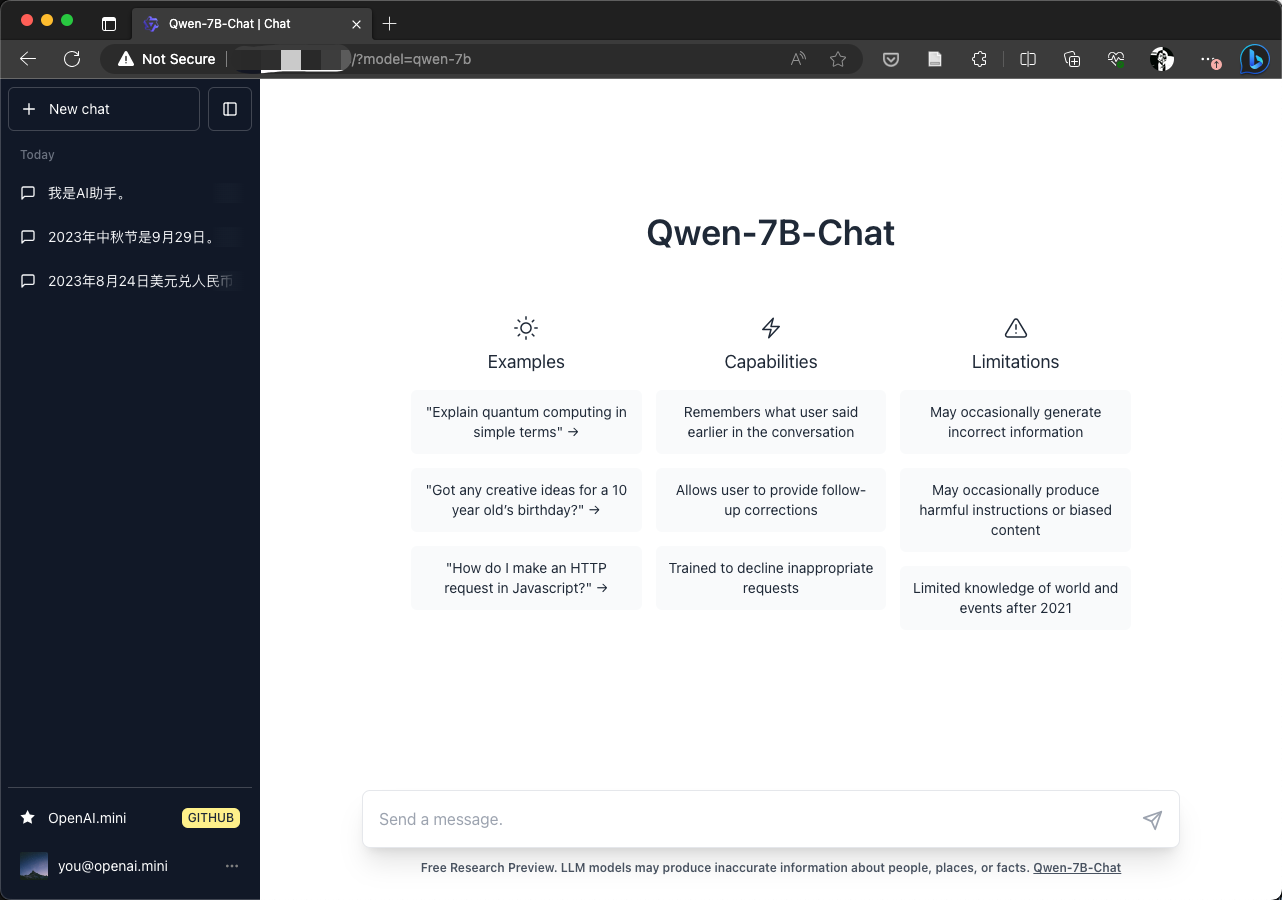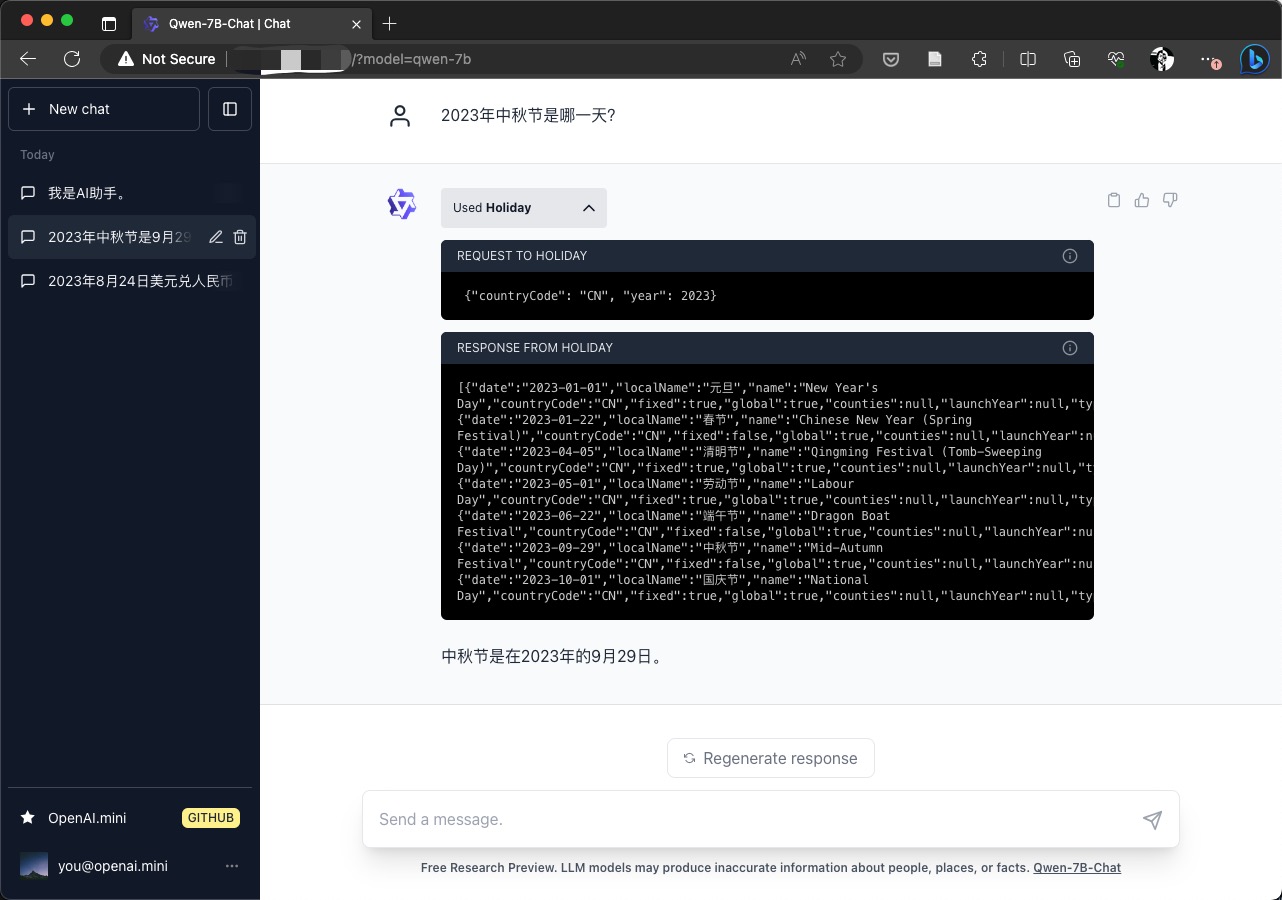As the OpenAI APIs continue to advance at a swift pace, I foresee challenges in dedicating the necessary time to maintain this repository effectively. Regrettably, I might not be able to sustain the level of commitment required to ensure its upkeep going forward. Your understanding and support in this matter would be greatly appreciated. Thank you for your understanding.
This repo implements OpenAI APIs with open source models, for example, open source LLMs for chat, Whisper for audio, SDXL for image and so on. With this repo, you can interact with LLMs using the openai libraries or the LangChain library.
pip3 install -r requirements.txt
pip3 install -r app/requirements.txtIf you have make, you can also run with
make installYou may build the frontend with yarn yourself, or just download the built package from the release.
cd app/frontend
yarn install
yarn build-
Download the
dist.tar.gzfrom release page. -
Extract the
distdirectory and put it in theapp/frontenddirectoryPlease make sure that the directory layout should be like this:
┌─hjmao in ~/workspace/openai.mini/app/frontend/dist └─± ls asset-manifest.json assets favicon.ico index.html manifest.json robots.txt static
cp .env.example .env
# Modify the `.env` fileIf you have already downloaded the weight files, or you want to manage the model weights in some place, you can specify a MODEL_HUB_PATH in the .env and put the weight files in it. MODEL_HUB_PATH is set to hub by default.
OpenAI.mini will first find the model weight in MODEL_HUB_PATH, if it does not exist in it, it will automatically download the weight files from Huggingface by the model name. The MODEL_HUB_PATH directory will be like this
MODEL_HUB_PATH directory layout
┌─hjmao at 573761 in ~/workspace/openai.mini/hub
└─○ tree -L 2
.
├── baichuan-inc
│ ├── Baichuan-13B-Base
│ ├── Baichuan-13B-Chat
│ └── Baichuan2-13B-Chat
├── intfloat
│ ├── e5-large-v2
│ └── multilingual-e5-large
├── meta-llama
│ ├── Llama-2-13b-chat-hf
│ └── Llama-2-7b-chat-hf
├── openai
│ ├── base.pt
│ ├── large-v2.pt
│ ├── medium.en.pt
│ ├── medium.pt
│ ├── small.pt
│ └── tiny.pt
├── Qwen
│ ├── Qwen-7B-Chat
│ └── Qwen-72B-Chat
├── stabilityai
│ ├── FreeWilly2
│ ├── stable-diffusion-xl-base-0.9
│ └── stable-diffusion-xl-base-1.0
├── thenlper
│ └── gte-large
└── THUDM
├── chatglm2-6b
├── chatglm3-6b
└── codegeex2-6bNotice: the models can be loadded on startup or on the fly.
python3 -m src.api
python3 -m app.serverOpenAI.mini have implemented most APIs of the OpenAI platform and also a ChatGPT-like web frontend. You may access the OpenAI.mini services with the openai libraries or chat with the models in the web frontend.
- Access as a openai service: You can use openai packages or the Langchain library to access it by setting the
openai.api_base="YOUR_OWN_IP:8000/api/v1"and `openai.api_key="none_or_any_other_string". Find more detail examples here. - Access as a ChatGPT: You can open it with your web browser with
http://YOUR_OWN_IP:8001/index.html?model=MODEL_NAME.
| Services | API | Status | Description |
|---|---|---|---|
| Authorization | |||
| Models | List models | ✅ Done | |
| Models | Retrieve model | ✅ Done | |
| Chat | Create chat completion | Partial Done | Support Multi. LLMs |
| Completions | Create completion | ||
| Images | Create image | ✅ Done | |
| Images | Create image edit | ||
| Images | Create image variation | ||
| Embeddings | Create embeddings | ✅ Done | Support Multi. LLMs |
| Audio | Create transcription | ✅ Done | |
| Audio | Create translation | ✅ Done | |
| Files | List files | ✅ Done | |
| Files | Upload file | ✅ Done | |
| Files | Delete file | ✅ Done | |
| Files | Retrieve file | ✅ Done | |
| Files | Retrieve file content | ✅ Done | |
| Fine-tuning | Create fine-tuning job | ||
| Fine-tuning | Retrieve fine-tuning job | ||
| Fine-tuning | Cancel fine-tuning | ||
| Fine-tuning | List fine-tuning events | ||
| Moderations | Create moderation | ||
| Edits | Create edit |
| Model | Embedding Dim. | Sequnce Length | Checkpoint link |
|---|---|---|---|
| bge-large-zh | 1024 | ? | BAAI/bge-large-zh |
| m3e-large | 1024 | ? | moka-ai/m3e-large |
| text2vec-large-chinese | 1024 | ? | GanymedeNil/text2vec-large-chinese |
| gte-large | 1024 | 512 | thenlper/gte-large |
| e5-large-v2 | 1024 | 512 | intfloat/e5-large-v2 |
| Model | #Resp Format | Checkpoint link |
|---|---|---|
| stable-diffusion-xl-base-1.0 | b64_json, url | stabilityai/stable-diffusion-xl-base-1.0 |
| stable-diffusion-xl-base-0.9 | b64_json, url | stabilityai/stable-diffusion-xl-base-0.9 |
| Model | #Params | Checkpoint link |
|---|---|---|
| whisper-1 | 1550 | alias for whisper-large-v2 |
| whisper-large-v2 | 1550 M | large-v2 |
| whisper-medium | 769 M | medium |
| whisper-small | 244 M | small |
| whisper-base | 74 M | base |
| whisper-tiny | 39 M | tiny |
import openai
openai.api_base = "http://localhost:8000/api/v1"
openai.api_key = "none"
for chunk in openai.ChatCompletion.create(
model="Baichuan2-13B-Chat",
messages=[{"role": "user", "content": "Which moutain is the second highest one in the world?"}],
stream=True
):
if hasattr(chunk.choices[0].delta, "content"):
print(chunk.choices[0].delta.content, end="", flush=True)import openai
openai.api_base = "http://localhost:8000/api/v1"
openai.api_key = "none"
resp = openai.ChatCompletion.create(
model="Baichuan2-13B-Chat",
messages = [{ "role":"user", "content": "Which moutain is the second highest one in the world?" }]
)
print(resp.choices[0].message.content)import openai
openai.api_base = "http://localhost:8000/api/v1"
openai.api_key = "none"
embeddings = openai.Embedding.create(
model="gte-large",
input="The food was delicious and the waiter..."
)
print(embeddings)import os
import openai
openai.api_base = "http://localhost:8000/api/v1"
openai.api_key = "none"
openai.Model.list()import os
import openai
from base64 import b64decode
from IPython.display import Image
openai.api_base = "http://localhost:8000/api/v1"
openai.api_key = "none"
response = openai.Image.create(
prompt="An astronaut riding a green horse",
n=1,
size="1024x1024",
response_format='b64_json'
)
b64_json = response['data'][0]['b64_json']
image = b64decode(b64_json)
Image(image)# Cell 1: set openai
import openai
openai.api_base = "http://localhost:8000/api/v1"
openai.api_key = "None"
# Cell 2: create a recorder in notebook
# ===================================================
# sudo apt install ffmpeg
# pip install torchaudio ipywebrtc notebook
# jupyter nbextension enable --py widgetsnbextension
from IPython.display import Audio
from ipywebrtc import AudioRecorder, CameraStream
camera = CameraStream(constraints={'audio': True,'video':False})
recorder = AudioRecorder(stream=camera)
recorder
# Cell 3: transcribe
import os
import openai
temp_file = '/tmp/recording.webm'
with open(temp_file, 'wb') as f:
f.write(recorder.audio.value)
audio_file = open(temp_file, "rb")
transcript = openai.Audio.transcribe("whisper-1", audio_file)
print(transcript.text)项目参考了很多大佬的代码,例如 @xusenlinzy 大佬的api-for-open-llm, @hiyouga 大佬的LLaMA-Efficient-Tuning 等,表示感谢。

